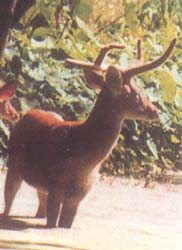|
Wildlife
The Keibul Lamjao National Park
Spread in an area of 40 sq km, Keibul Lamjao National Park in Manipur
was established in the year 1966 as a Sanctuary and in the year
1977 as a National Park. Keibul Lamjao National Park Manipur is
probably the world's only 'floating sanctuary' that comprises 40
sq km of wetland overgrown with 1.5 m. deep floating vegetation
(called phumdi). The park has several distinguishing features. Besides
the vegetation and terrain, an important highlight of the park is
the Loktak Lake (6,475 ha), the largest freshwater lake in India;
a large portion of which falls within the park.
Ecosystem of the Keibul Lamjao National
Park
The Flora :
Keibul Lamjao consists of the unique 'phumdi' or floating marshes.
Eight y
per cent of the flora is submerged and the vegetation forms a 90-120
cm. thick cover on the water surface. About half a century ago,
the predominant plants used to be tou (45 per cent), singut (25
per cent) and khoimom (15 per cent). But the composition of the
vegetation has undergone rapid changes and the plant cover, at present,
is estimated to comprise of equal proportions of hoop Leersia hexandra
and sing kambong Zizania latifolia, a protein-rich plant, often
used as food (about 24 per cent). y
per cent of the flora is submerged and the vegetation forms a 90-120
cm. thick cover on the water surface. About half a century ago,
the predominant plants used to be tou (45 per cent), singut (25
per cent) and khoimom (15 per cent). But the composition of the
vegetation has undergone rapid changes and the plant cover, at present,
is estimated to comprise of equal proportions of hoop Leersia hexandra
and sing kambong Zizania latifolia, a protein-rich plant, often
used as food (about 24 per cent).
The Animals
Some very rare animals may be seen in and around this wilderness.
The star attraction, of course, is the brow-antlered deer Cervus
eldi eldi, called sangai in the local Meitei dialect. This particular
subspecies of the Thamin deer is also fondly called Manipur's dancing
deer because of its delicate gait as it negotiates its way along
the floating wetlands. Other species of deer seen here include the
hog deer, sambar and muntjac. One of the most primitive primates,
the slow loris occurs in scattered pockets on the hills. Assamese
and stump-tailed macaques and the Hoolock gibbon are restricted
mainly to the western hills. The Rhesus monkey is found ubiquitously
around the park. The large Indian civet Viverra zibetha and small
Indian civet Viverricula indica, common otter Lutra lutra and wild
boar Sus scrofa are some of the large mammals found in the area.
Extremely rare lesser wild cats like the marbled cat and Temminck's
golden cat may be sighted occasionally. The Himalayan black bear
and the Malayan bear may also be seen foraging for food.
The Birds
A variety of ra re
birds occur in Keibul Lamjao and the Loktak Lake. The avifauna consists
primarily of the smaller reed-dwelling species. Waterfowl, which
were unfailing winter migrants to the lake, are becoming more rare
because of the lack of open water surfaces. The Hooded Crane may
be seen in the Manipur valley. The Black Eagle and the Shaheen Falcon
are some of the raptors seen here. The Eastern White Stork, Bamboo
Partridge and Green Peafowl are also found here. re
birds occur in Keibul Lamjao and the Loktak Lake. The avifauna consists
primarily of the smaller reed-dwelling species. Waterfowl, which
were unfailing winter migrants to the lake, are becoming more rare
because of the lack of open water surfaces. The Hooded Crane may
be seen in the Manipur valley. The Black Eagle and the Shaheen Falcon
are some of the raptors seen here. The Eastern White Stork, Bamboo
Partridge and Green Peafowl are also found here.
Some of the species of hornbills found here include the Brownbacked
Hornbill, Rufousnecked Hornbill, Wreathed Hornbill, the Pied Hornbill
and the Great Pied Hornbill.
Manipur Zoological Garden
About 6 km. from Imphal, towards the west, in Manipur Zoological
Garden at Iroishemba lying on the Imphal Kangchup Road. You will
find some rare to be found species in this zoological garden. A
trip to the Manipur Zoological Garden, at the foot of the pine-growing
hillocks in the westernmost corner of Lamphelpat is really enjoyable.
You will have an opportunity to see the graceful brow antlered
deer (Sangai), one of the rarest species in the world, in sylvan
surroundings of the Garden.
Top
Information on wildlife tours, wildlife viewing, wildlife park and nature of Manipur - india
|








 y
per cent of the flora is submerged and the vegetation forms a 90-120
cm. thick cover on the water surface. About half a century ago,
the predominant plants used to be tou (45 per cent), singut (25
per cent) and khoimom (15 per cent). But the composition of the
vegetation has undergone rapid changes and the plant cover, at present,
is estimated to comprise of equal proportions of hoop Leersia hexandra
and sing kambong Zizania latifolia, a protein-rich plant, often
used as food (about 24 per cent).
y
per cent of the flora is submerged and the vegetation forms a 90-120
cm. thick cover on the water surface. About half a century ago,
the predominant plants used to be tou (45 per cent), singut (25
per cent) and khoimom (15 per cent). But the composition of the
vegetation has undergone rapid changes and the plant cover, at present,
is estimated to comprise of equal proportions of hoop Leersia hexandra
and sing kambong Zizania latifolia, a protein-rich plant, often
used as food (about 24 per cent).
